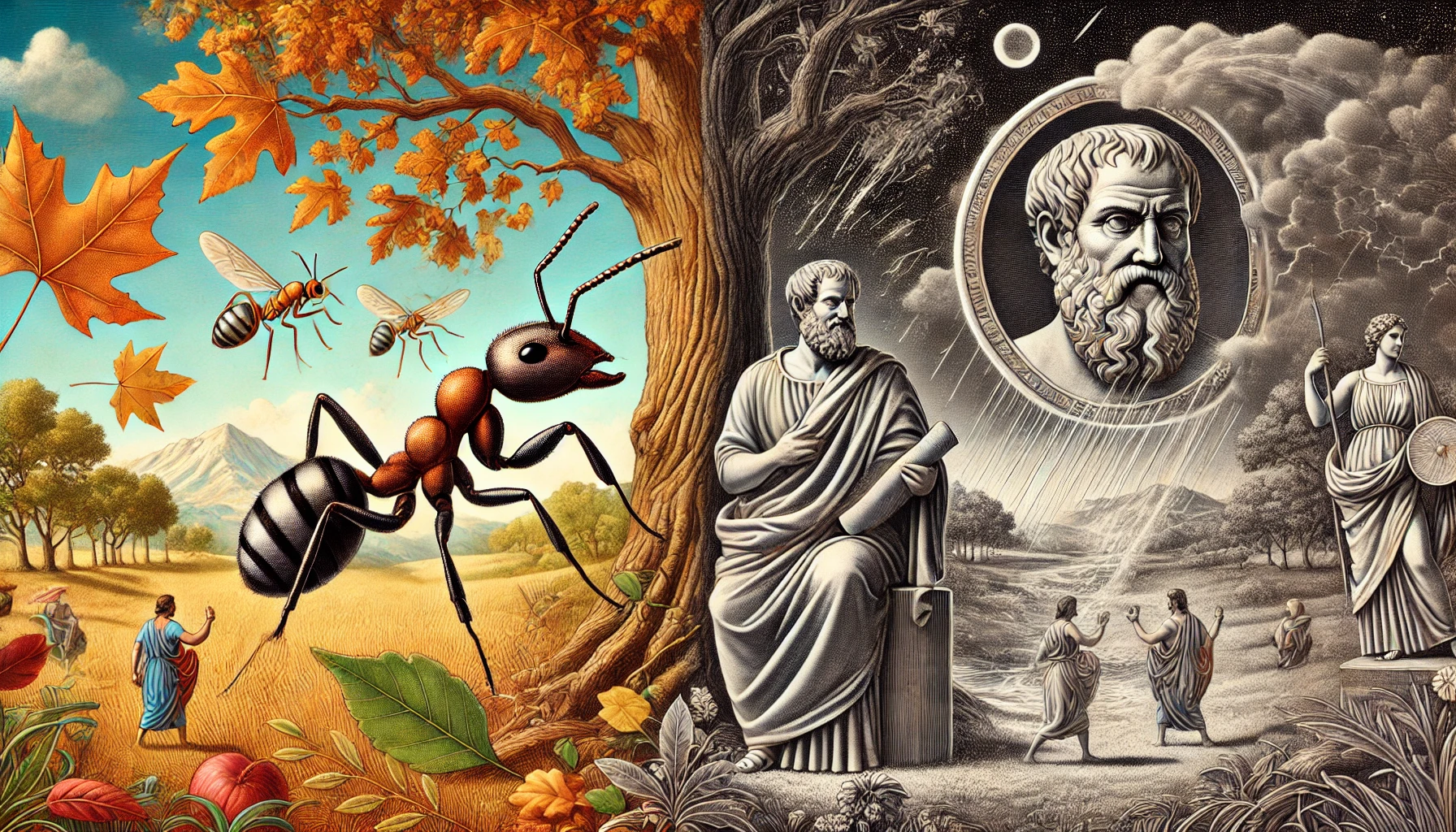This article explores the purposefulness of natural phenomena, focusing on Aristotle’s theory of purpose, and discusses perspectives and criticisms from modern and contemporary science, as well as ecological reassessments.
Is everything that happens in nature purposeful? Ants hobbling around carrying twigs and leaves larger than their bodies certainly seem purposeful. These behaviors help them survive and reproduce, and contribute to the life of the colony. They have a clear purpose in gathering food, maintaining their nests, and caring for their larvae. But do the leaves that fall in the fall or the hail that comes down in the middle of the night have a purpose? Leaves fall to help trees conserve energy for winter survival and prepare for a new growth cycle. Hail is a natural phenomenon that forms in response to weather conditions, and while it may not seem to have a specific purpose, it’s part of nature’s grand cycle.
“Aristotle presents a purposivist theory of nature in which all natural things have a purposeful nature and move according to their intrinsic nature, not external causes. He believes that natural things not only have a purpose, but also have the capacity to realize it. “Aristotle believes that the purpose will always be realized unless it is interfered with, and that the realization of the natural purpose always produces desirable results for the subject of the movement. “Aristotle summarizes his view with the phrase “nature does not work in vain”. From this perspective, all phenomena in nature ultimately have a purpose, which can be understood within the order and harmony of nature.
Aristotle’s theory of purpose applies not only to the growth and development of living things, but also to changes in non-living things. For example, the flow of a river from high to low might be explained by the simple action of gravity, but Aristotle saw it as the natural purpose of nature, the tendency of everything to find its own place. As such, his theory involves an attempt to interpret natural phenomena as more than just physical laws.
In modern times, as the view that all things are lifeless machines has been emphasized, Aristotle’s teleology has faced much criticism for being unscientific. “Galileo Galilei argues that purposivist explanations cannot be used as scientific explanations, Francis Bacon considers the search for purpose to be fruitless for science, and Spinoza criticizes purposivism for distorting our understanding of nature. Their criticism is that teleology anthropomorphizes non-human natural objects as having reason. In contrast to these criticisms, however, Aristotle divides nature into animate and inanimate objects, plants, animals, and humans, and believes that only humans have reason.
Nevertheless, modern reassessments of teleology have gained increasing attention. Some modern scholars criticize modern thinkers for failing to provide sufficient grounds for rejecting Aristotle’s purposivism, relying instead on a kind of dogmatic belief that the mechanistic model based on the science of the time was more convincing. In this context, David Bolotin points out that modern science has not shown that nature has no purpose, nor has it attempted to do so. Woodfield also points out that while purposivist explanations are not scientific explanations, they cannot be said to be false because we cannot verify the rightness or wrongness of purposivism.
Recent developments in environmental philosophy and ecology have led to a rethinking of Aristotle’s teleology. It has been argued that an intentionalist perspective can be useful in understanding the complex interactions and balances of ecosystems. For example, each organism in an ecosystem has complex relationships with other organisms for its own survival and reproduction, and these relationships can be interpreted as more than just mechanical interactions. This sheds new light on understanding the purposefulness of nature and provides important lessons for humans to live in harmony with nature.

In the 17th century, science demanded that scientific explanations be verified through experimentation. This tendency led to materialism, which states that everything in the world, including living things, is composed of matter, and part of materialism is reductionism, which states that all biological processes are explained by physical and chemical laws. This reductionism implies that living things are no different from dead matter. However, Aristotle refuted Empedocles’ view that knowing the material components of a natural object explains its entire nature. This refutation implies that natural objects are not simply made of matter, nor is their nature simply reducible to physics and chemistry.
Despite advances in science, the challenge of determining exactly how and why life exists is still ongoing. Aristotle’s exploration of the components of nature was intended to reveal how and why natural things exist and move, and his theory of purpose is the starting point of this ongoing inquiry. While Aristotle’s theory of purpose is not a complete explanation in itself, it has enriched our understanding of natural phenomena and helped us to more clearly delineate the boundaries between living and nonliving things. His philosophy is still at the center of many discussions today, and remains an important intellectual asset for exploring the purposefulness of nature.
Furthermore, modern scientific discoveries and technological advances are providing opportunities to interpret and apply Aristotle’s theory of purpose in new ways. For example, the evolutionary perspective in biology suggests that organisms may exhibit purposeful behavior in the process of adapting to their environment. This may be partly connected to Aristotle’s claim of purposefulness in nature. As human technology and science advance, we have the opportunity to gain a deeper understanding of the complexity of nature and the purpose behind it.
In conclusion, Aristotle’s teleology is not just a philosophical legacy of the past, but a way of understanding nature that is still valid today. His theory provides an important framework for explaining natural phenomena and the behavior of living things, and offers deep insights into how we can live in harmony with nature. This purposivist perspective can also play an important role in addressing today’s environmental problems and ecological crises. By reaffirming the purposefulness of nature and human responsibility, we can move toward a more sustainable future.